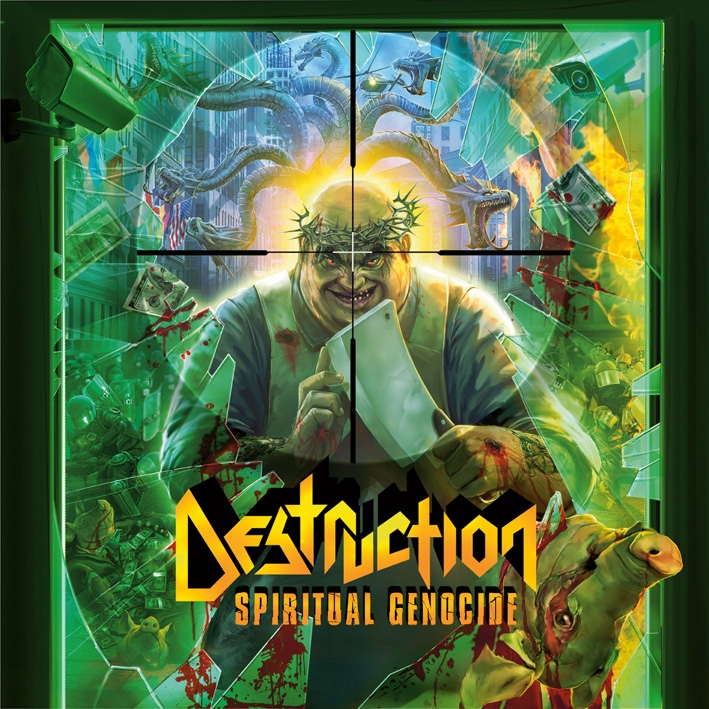
Album Review: Destruction - "Spiritual Genocide"
Okay kids, gather round. It’s confession time.
When I first looked at Destruction’s “Spiritual Genocide,” I was not all that excited. Destruction has never been a band that more than momentarily blipped on my radar, and calling their album “Spiritual Genocide” was not the fast track to changing that. Then, the cover art. Let’s all admit it, the art here is fairly shallow and roundly awful. If you’re in Destruction and you’re reading this, I’m sorry but it’s true. We’ve all seen a million different covers that depict some authority figure in a negative light, smirking with an evil affectation. In this case it’s a priest, resplendent in his personal crown of thorns, and as far as that idea relates to the album’s theme, I get it. But then there’s a severed pig head, a sort of Leviathan in the background and some crosshairs. The stew of mixed imagery is akin to someone taking the challenge of trying to make “The Day of the Jackal,” “Dragon Wars: D-WAR” and the Nine Inch Nails “Closer” video into one cohesive idea.
Yet, the journalist in me (if I can be forgiven for calling myself one,) didn’t want to judge the book by its cover, so I jogged down to the deep end of the pool and went headlong into it.
What I was met with defied all expectations. Where I was expecting another blasé entry in the heretofore played out catalog of German thrash, I was instead greeted with another chapter in the burgeoning thrash revival of the new millennium. Taking lessons and inspiration from other resurgent thrash acts like Slayer, Testament, Accept, Exumer and their own Teutonic brothers Kreator, Destruction has put their nose to the grindstone and pressed an album, that if not a classic, easily contends for the title of best album of Destruction’s career.
Have patience, gentle reader. While the opening tracks like “Cyanide” have their appeal, it isn’t until the rhythmic bucking of “City of Doom” that “Spiritual Genocide” truly finds its stride. Similar to GWAR’s “Crosstika,” “City of Doom” employs an effective and hook-laden melodic riff that is supported in the gaps with alternating machine gun riffing. It’s an old trick, but that hardly means the luster has faded.
This plays directly into “No Signs of Repentance,” and now we’re officially off to the races. It would have been easy for a band that’s been in the game as long as Destruction to simply put some basic riffs together and press them to a record, but the song construction through this middle portion proves that the band aspired to more. The artful solo of “No Signs…” proves that the band is willing to sacrifice the last edge of speed in favor of melodic pairing, and that’s a trade that more band should be willing to make.
Thereafter, you’ll hit “To Dust You Will Decay,” the album’s single best offering and the cut that makes “Spiritual Genocide” worth the price of admission. The song changes speeds, uses a medium drum cadence to set the tone and employs the simplest of riffs to enhance a chanted chorus that ties this whole thing together with a great big thrash bow. More than any other cut on the album, this track shows the authority that thrash can speak with when all the pieces are custom fit to each other. “To Dust…” is hardly the fastest or most technically complicated song that “Spiritual Genocide” offers, but don’t let that dissuade you; it is the album’s best.
After that it’s more of the delicious same, including the all around solid “Legacy of the Past” (a loving tribute to the pantheon of metal acts gone by,) but the three song set in the middle are the trump cards of Destruction’s newest effort.
It should be noted that “Spiritual Destruction” will sound familiar to veteran fans of thrash, and that’s because almost every riff borrows from some classic concept or tone that we’ve heard a thousand times before. That doesn’t mean it’s bad, merely that it’s not the pinnacle of innovation. And that’s fine, an album this well constructed and enjoyable doesn’t need to be. Hell, AC/DC has been proving that point for more than three decades.
While “Spiritual Genocide” didn’t hit me as hard in repeated listening as it did the first tour, it’s still a great album, enjoyable for the right reasons and a nice continuance of the rebirth of thrash for the modern era. Take a few minutes with it to try it out.

